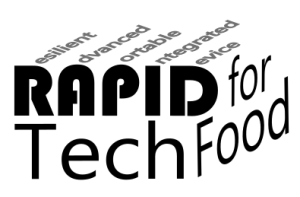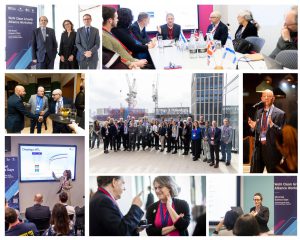Events and activities are aimed at intra-and inter-theme synergies and particularly at identifying cross-disciplinary opportunities across the two countries. These are linked to current global challenges (within the Sustainable Development Goals). Consequently, this delineates future collaborative links which will combine the strengths and experience of colleagues across the two institutions.
University of Birmingham (UoB) and Ben Gurion University (BGU) are prominent research institutions, keenly interested in promoting international collaborations. Both institutions currently focus on nurturing and expanding Israel-UK scientific cooperation as a strategic goal. Indeed, the recent award to the two institutions under the British Council UK-Israel Strategic Collaboration program, led by Oppenheimer and Jelinek, manifests both the commitment of the two institutions, the track record of the collaborative efforts by the Principle Investigators and the significant potential for enhancing the scientific links between the UK and Israel through the proposed initiative. In particular, ‘Biomedical Technologies’ – which is at the core of the collaboration efforts of Profs. Oppenheimer and Jelinek – which constitute core research directions in both institutions and historically have enjoyed interest and research activity in UK-Israel scientific and technological relationships.
Specific events that have taken place during the last 2 years include:
1. Strategic planning designed to lay the groundwork of the project, create network, making research plans.
2. Promoted collaborative research through virtual and face-to-face meetings, symposia, student-exchange and sharing research facilities.
3. Promoted applied research and establish viable collaborations with industry.
4. Communicated academic research to students, researchers, and the general public.
5. Leverage the Centre for establishment a longer-term strategic collaboration between UoB and BGU.
Events
– Public outreach, UK-Israel, 2023-24: The activities were communicated to both the general public and scientific community through several channels, including the two institutions PR departments, social media campaigns, and dissemination avenues. Most publication activities were carried out through dedicated personnel and outsourcing.
International Workshop – Working Towards Sustainable UN Goals, August 2024:
Global food safety and security are severely threatened due to the escalating population, limited Earth resources and climate change. The survival and growth of pathogens in the environment and the food matrix have increased food spoilage, posing a significant risk to public health (UN Food Waste, 2021). The urgency to restore public trust in food has propelled global organisations such as the Food and Agriculture Organisation and the United Nations Environment Programme to propose sustainable development goals.
Through an international workshop at the UN’s central location, participants gathered to brainstorm and advance technologies that support the UN’s sustainable development goals for food security and nutrition. Among the technologies discussed, Raman Spectroscopy and Surface Enhanced Raman Spectroscopy, emerging from Prof. Oppenheimer’s laboratory at the University of Birmingham and Prof. Jelinek’s laboratory at Ben-Gurion University, were highlighted as highly sensitive spectroscopic techniques with significant potential for pathogen detection and food safety applications. The workshop explored various methodologies, including innovations in sample preparation and the integration of artificial intelligence to enhance accuracy, sensitivity, and quantitative data analysis. A critical unmet need identified was for simple, rapid, and portable systems for pathogen detection in food.
Future activities planned by the Principal Investigators include a fellowship visit to Israel by one of Prof. Oppenheimer’s PhD students, alongside a research exchange with Dr S. Kolusheva from Ben-Gurion University, who will join Prof. Oppenheimer’s ANMSA Group. These exchanges align with the broader objectives of the Clean Growth Alliance, promoting collaboration between the UK and Israel in the domains of clean growth related to food, water and energy.

UK-Israel Science Days 2023 |
|
In March UK and Israel celebrated research and academic collaboration in London, launching UK-Israel science days events. This series of events and Grand reception offered us as Wohl Funding grantees an opportunity to participate in professional workshops and roundtables showcasing our different programmes and discussing current and future development and growth. We also had the pleasure to take part in a clean growth workshop on one’s of London’s greenest buildings- British Council’s headquarters. Bringing together our UK and Israeli researchers supported by the Wohl Clean Growth Alliance programme, to present our work and take part in roundtables and panel discussions, and meeting with senior policy makers! The UK – Israel science days were also a great opportunity to meet a Partners Forum, having all current partners, share their ideas and envision together the future and development of British Council programmes and partnerships.
|
– Kick-start ‘brain-storming’ Workshop at BGU, Summer 2022: The two PIs initiates a process of putting together a research plan through convening a “round table” of stakeholders from the two participating institutions, other academic entities, industry and government in order to stablish a framework for implementation of the Wohl Alliance initiative.
– International workshop, July 2023: Bi-institutional meeting and research workshop with student exchange took place at BGU in July. Meetings were dedicated to both presenting and discussing general topic and strategic aspects and brainstorming ideas designed to address specific research challenges arising through the collaborative research. Students gained experience in biotechnology engineering, standard microbiology techniques, and a broad range of analytical techniques. Working closely in an interdisciplinary team with bio-scientists and engineers, the students got introduced to mapping sources of variability throughout the process e.g., identifying factors leading to batch-to-batch variability, monitoring and controlling the manufacturing and bacterial presence/specifications to deliver well-characterized platforms for specific low-cost, sensitive and rapid detection platforms.

